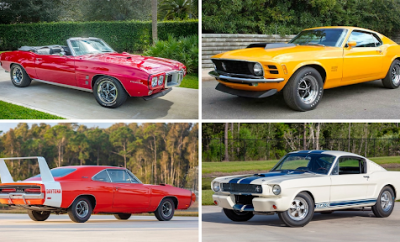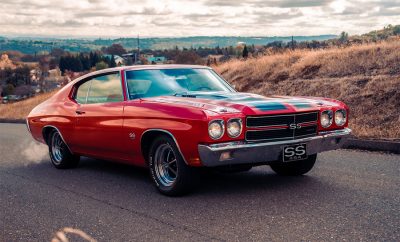Best Muscle Cars
Revving Up Returns: Smart Investment Strategies for Classic Muscle Cars

When it comes to investing, pursuing profit leads us down conventional avenues such as stocks, real estate, and bonds. Yet, classic muscle cars are a thrilling and often overlooked frontier for the discerning few.
The allure lies in their raw power, striking aesthetics, and potential for appreciation over time. However, it’s crucial to approach classic muscle cars with knowledge and strategy, like any investment.
In this guide, we’ll provide insights, tips, and strategies to navigate the dynamic world of classic muscle car investments.
Budgeting and Financial Planning
Establishing clear investment goals is a fundamental first step in building a successful classic muscle car investment strategy. These goals will help guide your decision-making process and shape your overall approach to the market.
Determine whether you aim for short-term gains through quick flips or long-term appreciation. Also, clearly define your profit objectives. Are you looking for modest returns, significant capital appreciation, or a combination? Understanding your desired profit margin will inform your acquisition strategy.
Moreover, building a budget is critical to managing your classic muscle car investments. Determine the total amount of capital you’re willing to allocate. It should be an amount you can comfortably invest without compromising your financial stability.
Account for ongoing expenses associated with your collection, such as storage costs, insurance, maintenance, and potential restoration expenses. Ensure these costs are factored into your budget to avoid unexpected financial burdens.
Setting aside a contingency fund for unexpected expenses or market fluctuations is wise. A buffer in your budget can provide peace of mind and financial flexibility.
Research and Due Diligence
Regarding classic muscle car investments, not all vehicles are created equal. Some makes and models have earned legendary status due to their performance, design, and historical significance, making them more desirable to collectors and investors.
It’s like health insurance. There are the standard policies that cover the basics, and then there are the premium plans that offer additional perks and coverage for those willing to invest a bit more, such as PPO plans. But what is PPO insurance? It represents a type of health insurance plan that balances flexibility and cost.
Moreover, here’s a closer look at the aspects of identifying desirable makes and models:
- Performance and Legacy: Research the muscle cars known for their exceptional performance during their era.
- Limited Production: The lower the production numbers, the more exclusive the car becomes, potentially leading to higher demand and prices.
- Historical Significance: Some muscle cars played a pivotal role in automotive history.
- Popularity Trends: Certain makes and models may experience surges in popularity due to cultural shifts or the influence of popular media.
Beyond the model itself, the history and provenance of an individual muscle car can significantly impact its value and investment potential. Here’s how to delve into this crucial aspect of due diligence:
- Ownership History: A documented history of previous owners, especially if they were notable figures or collectors, can add prestige to a vehicle and increase its value.
- Maintenance and Restoration Records: A well-documented maintenance history can reassure potential buyers and investors.
- Matching Numbers: Cars with matching numbers – indicating that the engine, transmission, and other major components are original to the vehicle – tend to command higher prices.
- Provenance Documentation: Build sheets, original sales invoices, and factory records can establish a car’s provenance and bolster its value.
- Certifications and Appraisals: These documents can independently verify a car’s condition and provenance.
- Accident and Title History: Utilize services that can provide comprehensive vehicle history reports to uncover any accidents, title issues, or undisclosed damage that may affect the car’s value and desirability.
Diligent research and a keen understanding of a vehicle’s history and desirability are essential steps toward making informed investment decisions that can rev up your returns.
Sourcing and Acquiring Classic Muscle Cars
There are several avenues to explore for sourcing and acquiring classic muscle cars. Auctions, whether live or online, offer a dynamic environment for buyers, though it’s crucial to conduct thorough research on upcoming events and establish a budget to avoid overbidding.
Additionally, dealerships, particularly reputable ones, provide a reliable option with the advantage of a curated selection, but it’s essential to scrutinize their reputation and negotiate fair pricing.
Private sales, facilitated through platforms or networks, offer a more personalized approach, but due diligence is paramount to ensure transparency and legitimacy.
Negotiation tactics should be grounded in a realistic budget, comprehensive market research, and a focus on contingencies and inspections. Finally, documenting the transaction and ensuring legal compliance is crucial.
It encompasses drafting clear purchase agreements, handling title transfers and registrations meticulously, arranging proper insurance coverage, and seeking professional assistance.
Timing the Market and Recognizing Buying Opportunities
Successfully timing the market involves research, intuition, and a keen understanding of market trends. Regularly monitor market trends, attend auctions, participate in car shows, and engage with online forums and communities to stay informed about shifts in demand and pricing.
Additionally, keep a close eye on economic factors such as interest rates, inflation, and overall consumer sentiment. These indicators can influence the buying behavior of collectors and investors.
Moreover, recognize any seasonal patterns in the market. For example, some collectors may be more active during specific months leading to major automotive events. Furthermore, anticipate the potential value appreciation of emerging models gaining traction in the market. Being ahead of the curve can lead to strategic acquisitions.
Conclusion
Classic muscle cars can offer both intrinsic and financial rewards when approached with careful consideration and a well-informed strategy. Their enduring popularity, historical significance, and limited supply make them a compelling asset class capable of delivering significant returns over time.









0 comments